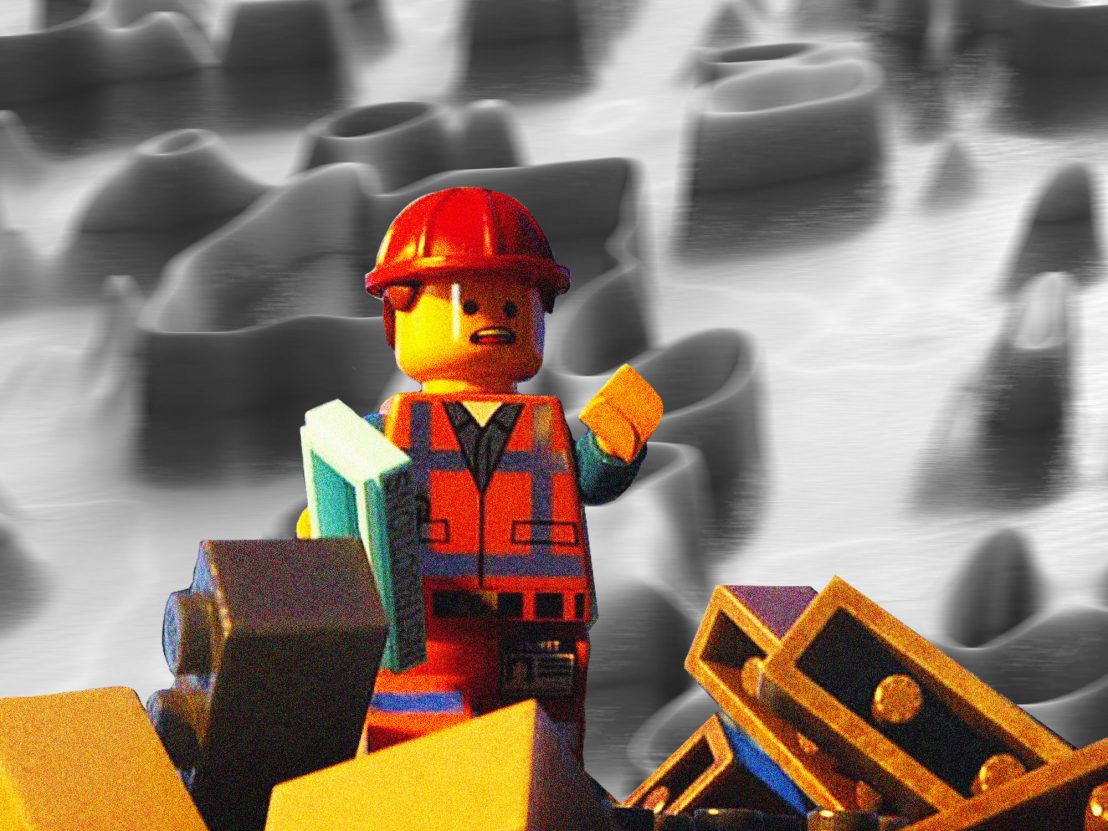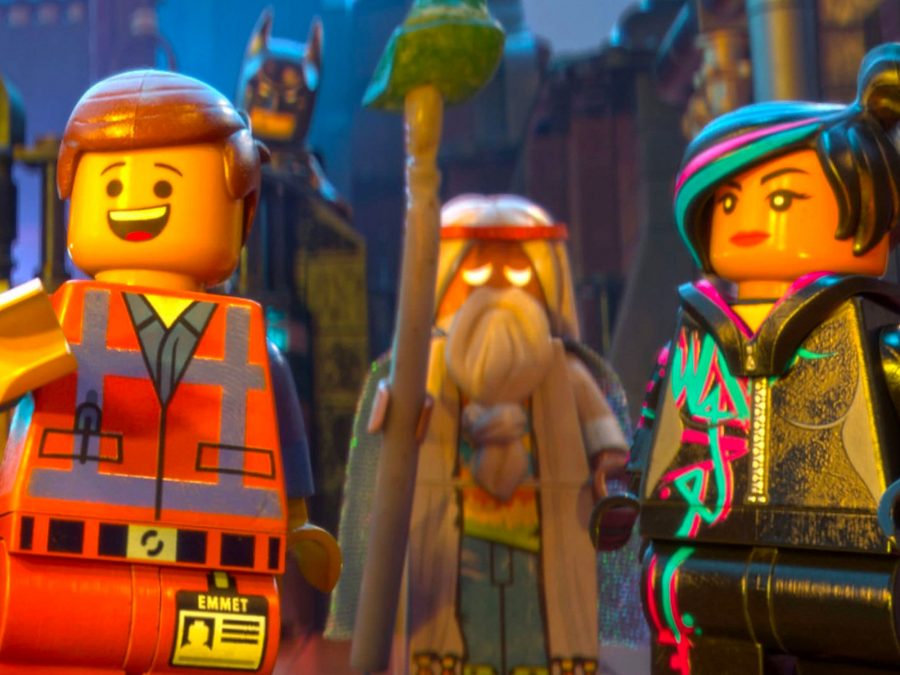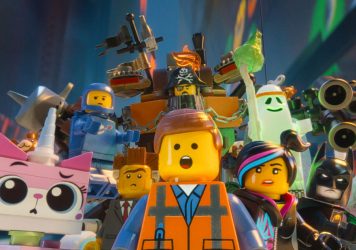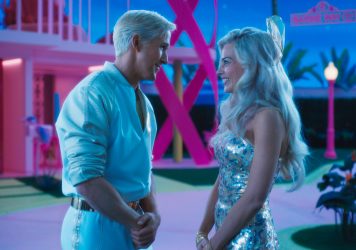
February might well be the most depressing month of the year, the exceptional sadness of January’s Blue Monday has long become normalised and any hopes of new beginnings have been resigned to same-old same-olds. So it’s hard for any movie – especially in America where anything with awards potential has already had its short qualifying run – to break through this short, dreary month. In 2004 Mel Gibson’s epic of eroticised violence, The Passion of the Christ, did, but it would take another decade for a February movie to match its $110 million opening week. One that would go on to be influential far outside the faith-based sub-industry Gibson helped to create. It’s hard to imagine a Hollywood so fixated on multiverses and multi-brand crossovers, like the Spider-Verse films or Space Jam: A New Legacy, without The Lego Movie, much less the more recent Barbie and Everything Everywhere All At Once, that aim for life-affirming, claiming to be expanding what movies can be while carefully curating the limits of our imagination.
While Passion locked into the kink and cruelty of the evangelical right, The Lego Movie aligned itself with the broader apologetic liberalism of the Obama era. Writer-directors Phil Lord and Christopher Miller show the Lego city of Bricksburg as a cutesy consumerist dystopia where everyone has a pre-set role and place that they move to in perfect Riefenstahlian order. They have no choice but to consume the same TV show and singular song until they like it. Lord and Miller then suggest that all the ills of this restrictive world can be fixed simply by rearranging a few of the pre-existing pieces.
The group of heroes that Emmet (Chris Pratt) – who is so much of an everyman that not even his co-workers can remember his name – finds himself amongst are an entrepreneurial sort. These “master builders” are made up of a collage of branded, historical and original (mini)figures who see the potential in the bricks around them; they rebuild and reinvent, but never truly change. They are heroes from a time when people believed that Elon Musk would take us to Mars. Luckily, anyone can become one, regardless of their circumstances – an idea taken to absurd ends in Lord & Miller’s follow-up of sorts, Spider-Man: Into the Spider-Verse, which tells us that anyone can become Spider-Man – Emmet is notably blue-collar and is only led to believe that he’s “the chosen [one]” so that he can find faith in his vision of what to build. This quasi-religious belief in success developed into hustle culture and from New Thought and mentalism; though the master builders appear as outsiders and outcasts, the same logic of business undergirds them.
Even still the movie suggests the limitations of their individuality. As Peter Labuza noted on Letterboxd, “within the film’s brief minute long expositional introduction [to the builder’s structureless, leaderless homeland Cloud Cuckoo Land] it suggests somewhere that the anarchic do-what-you-want land is unsustainable and its mandated happiness is perhaps leading toward trouble.” Therefore, the only way for the master builders to truly succeed is in collaboration with a more grounded and restrictive status quo, as embodied in its entirety by President Business (Will Ferrell).
Will Ferrell plays a similar role in the already similar Barbie: he is the symbol of patriarchal power. But the CEO of Mattel is mostly well-intentioned, if ignorant of his privilege, whereas President Business is, in no uncertain terms, a fascist. He wrote all the history books, he built all the voting machines, and now he wants to glue every person and piece into their proper place. But he is similarly portrayed as a misunderstood paternal figure who is just a little misguided. He is someone who Emmet not just could, but should appeal to the better nature of: he asks President Business to stop. For all Barbie’s brand apologia, the film at least sees the value of political intervention, if in the odd form of voter suppression and to the end of returning things to the way that they were. The Lego Movie can’t imagine political action beyond “Le-Go to the Polls”, a consent from power that all liberatory intent must be filtered through.

The Lego Movie’s (undoubtedly entertaining) action scenes suggest the anarchy of Michael Bay, but are neatly choreographed imitations of chaos – they project a disorder which is actually a complex kind of order. Similarly, the multiverse movies that it inspired project a huge breadth of new possibilities that will never be explored. Most notably in the Spider-Verse sequel, Across the Spider-Verse, where each of its supposedly infinite universes is condemned to have its own Spider-Man, as if he is some essential fact of existence rather than the product of a specific political, economic and personal context (something helpful to obscure for this film in particular).
It’s this obfuscation that reveals The Lego Movie and its ilk as active participants in, rather than just products of, the curation of what we imagine is possible. While The Lego Movie’s politics lay closer to the surface, it establishes a frame, the limited worldview, inside which all other multiverse movies exist. Each delving a little further in until they’ve become entirely untethered from reality: the narrative of Across the Spider-Verse is built entirely around the irrelevant concept of “canon events”, and the increasingly multiverse-centric MCU movies have so developed their own language and universe that it would be impossible for them to resonate with the real world, if they ever tried.
Barbie, at least, tries to imagine a way out. Stereotypical Barbie (Margot Robbie), the quintessential idea of Barbie, wants to escape from her enclosed world and become something more than a brand. But this can only come as an exchange. She gets to become a full person but her owner Gloria (America Ferrera) – with whom she has a psychic link, their emotions are transferable, as if their souls were in some sense shared – must turn her life into a product. She pitches the idea of Normal Barbie, a Barbie with her own normal, ‘real world’ problems, to the Mattel CEO and he accepts.
The Lego Movie also looks to the world outside its own, but there sees something far more terrifying. In the film’s only genuine surprise, Emmet falls off the edge of his world and lands in ours, where he finds out that everyone and everything he ever knew was just a toy (or a model, as he prefers) owned by Will Ferrell, a dedicated Lego adult, and now a literal father in conflict with his son who wants to use these toys in a more carefree, playful way. Here Emmet can hardly move. He is totally at the mercy of a figure he knew only as “the man upstairs”, and it is he, the totally powerless, who we are asked to identify with far more than the humans. The Lego world isn’t a reflection of the real world – the real world is a reflection of the Lego one.
That The Lego Movie can’t quite enclose its reality, even when it reveals only helplessness, makes it a strangely melancholic film. It still has some vague sense of a world where things are different, maybe even where they’re better, and even though it’s been pulled out of reach, it can’t quite look away from that receding horizon. The incessant irony, its constant need to diffuse any seriousness or real engagement with self-effacing humour, starts to look like a quirky off-beat kind of defeatism. In the absence of any real hope for change, one can only shrug off the world, returning to the doldrums of daily life with little more than a useless, self-aware smirk on their face; satisfied with a temporary alleviation from existential despair.
Published 4 Mar 2024

By Chris Blohm
Is this a glossy feature-length advert for toys? Nope, it’s a whimsical and hilarious piece of animated nostalgia from Phil Lord and Chris Miller.

With great jokes and a subversive moral core, this animated comedy manages to have its brick-based cake and eat it.

Greta Gerwig's behemoth blockbuster is a stranger, more fascinating film than its hyper-corporate marketing would suggest.